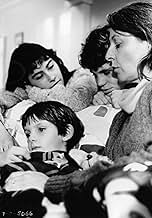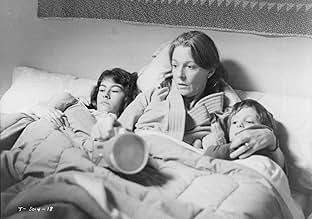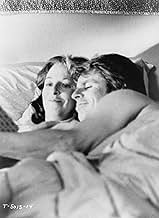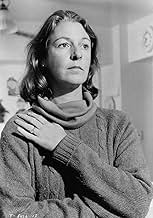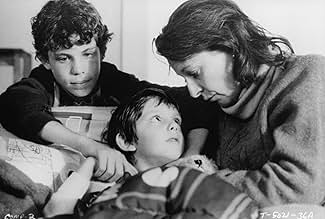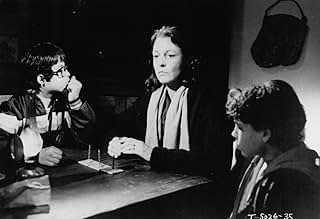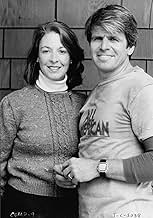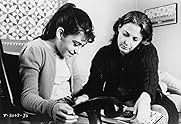IMDb-BEWERTUNG
6,9/10
7636
IHRE BEWERTUNG
Das Leben einer amerikanischen Vorstadtfamilie ist nach einem Atomangriff gezeichnet.Das Leben einer amerikanischen Vorstadtfamilie ist nach einem Atomangriff gezeichnet.Das Leben einer amerikanischen Vorstadtfamilie ist nach einem Atomangriff gezeichnet.
- Regie
- Drehbuch
- Hauptbesetzung
- Für 1 Oscar nominiert
- 2 Gewinne & 6 Nominierungen insgesamt
Rossie Harris
- Brad Wetherly
- (as Ross Harris)
William G. Schilling
- Pharmacist
- (as William Schilling)
Empfohlene Bewertungen
I first saw "Testament" when it came out in 1983. At the time, I was 30 years old and the mother of a two year-old son. As a child of the Cold War years, I have always been interested in films about that most unthinkable event: the detonation of a nuclear bomb or bombs somewhere on our fragile planet. If you are, too, you must watch "Testament" (and another small gem of a slightly earlier era called "Fail-Safe.")
This is a wonderful film that slowly, unbearably reveals what happens in the small, idyllic town of Hamlin after a full-scale nuclear exchange between the superpowers wipes out a large part of America. The town and its citizens, including the Weatherly family, escape initial destruction. But slowly the bonds that hold western societies together (electricity, communication, fresh food, medical help) begin to fray and ravel. There is no television. Batteries to power transistor radios suddenly become more valuable than $20 bills in a town where, suddenly, there's nothing left to buy.
The story and scenes are permeated with a sense of enormous loss. A family loses its husband and father who simply walked out the door, waving a breezy goodbye one morning, and disappeared into the holocaust. All his wife, Carol, and two children have left of him are their memories and some flickering images on home movies, glimpses not just of a lost loved one, but of a lost -- and loved -- world.
A school play about the Pied Piper was in rehearsal before catastrophe hit, and, desperate to recapture some normalcy and to divert the children's attention from a reality to horrible to contemplate, the town decides to go on with the show.In the earlier rehearsal scenes, life was normal, the future shone brightly in the children's faces. Now, as the parents watch the performance, they see no future for these beautiful innocents. To me, this is the key scene of the film: the contrast between what these people once had and what has been lost is staggering. It makes you want to go outside, smell the air, marvel at the full supermarket shelves and the working telephone lines. (This is a gift that the movie gives its audience which goes far beyond entertainment and approaches enlightenment.)
Beyond the wonderful writing, direction and performances, I love the tiny touches in the story. For example, there's the foreshadowing, the implicit warning contained in the presence of a minor character, a little Japanese boy with Down Syndrome who is cared for by the town after his father dies. The child's name is Hiroshi. Pay attention, the script commands us in a whisper: Hiroshima happened once, but it can happen again, and it can happen to you as well as "them."
In the end, the movie is a testament to this undeniable fact, a testament to the stupidity of men who continue building ever-larger, more lethal means of mass destruction, and finally, a testament to the strength of mothers like the character of Carol Weatherly who have no choice but to love and protect their children no matter what comes.
This is a wonderful film that slowly, unbearably reveals what happens in the small, idyllic town of Hamlin after a full-scale nuclear exchange between the superpowers wipes out a large part of America. The town and its citizens, including the Weatherly family, escape initial destruction. But slowly the bonds that hold western societies together (electricity, communication, fresh food, medical help) begin to fray and ravel. There is no television. Batteries to power transistor radios suddenly become more valuable than $20 bills in a town where, suddenly, there's nothing left to buy.
The story and scenes are permeated with a sense of enormous loss. A family loses its husband and father who simply walked out the door, waving a breezy goodbye one morning, and disappeared into the holocaust. All his wife, Carol, and two children have left of him are their memories and some flickering images on home movies, glimpses not just of a lost loved one, but of a lost -- and loved -- world.
A school play about the Pied Piper was in rehearsal before catastrophe hit, and, desperate to recapture some normalcy and to divert the children's attention from a reality to horrible to contemplate, the town decides to go on with the show.In the earlier rehearsal scenes, life was normal, the future shone brightly in the children's faces. Now, as the parents watch the performance, they see no future for these beautiful innocents. To me, this is the key scene of the film: the contrast between what these people once had and what has been lost is staggering. It makes you want to go outside, smell the air, marvel at the full supermarket shelves and the working telephone lines. (This is a gift that the movie gives its audience which goes far beyond entertainment and approaches enlightenment.)
Beyond the wonderful writing, direction and performances, I love the tiny touches in the story. For example, there's the foreshadowing, the implicit warning contained in the presence of a minor character, a little Japanese boy with Down Syndrome who is cared for by the town after his father dies. The child's name is Hiroshi. Pay attention, the script commands us in a whisper: Hiroshima happened once, but it can happen again, and it can happen to you as well as "them."
In the end, the movie is a testament to this undeniable fact, a testament to the stupidity of men who continue building ever-larger, more lethal means of mass destruction, and finally, a testament to the strength of mothers like the character of Carol Weatherly who have no choice but to love and protect their children no matter what comes.
I've seen this movie twice, and "Testament" still lingers in my brain as an atom bomb movie. And it's not really about that - the bomb comes and goes fairly quickly - but more about how a community comes together during the aftermath. It's kinda funny how the movie flips from TV commercial suburban life to sobering angst, where precious resources are rationed and then dry up completely.
But it is a powerful movie, thanks largely to the characters and the performances. Even as death loiters nearby and the losses keep piling up (god, this movie just keeps taking), there's Jane Alexander hanging on til the bitter end. Despite the climate of that period in the early '80s, subtlety is really this movie's strong suit. Characters die off, one by one, but it's never staged or theatrical. Very subdued; we'll just get a single image and put the horrifying pieces together.
It's kinda hard to believe there's a (tiny) ray of hope at the end of this thing. But man, it's a punishing journey.
7/10
But it is a powerful movie, thanks largely to the characters and the performances. Even as death loiters nearby and the losses keep piling up (god, this movie just keeps taking), there's Jane Alexander hanging on til the bitter end. Despite the climate of that period in the early '80s, subtlety is really this movie's strong suit. Characters die off, one by one, but it's never staged or theatrical. Very subdued; we'll just get a single image and put the horrifying pieces together.
It's kinda hard to believe there's a (tiny) ray of hope at the end of this thing. But man, it's a punishing journey.
7/10
Forget Freddie and Jason, if you want a real horror film then I recommend this because I think it will keep most normal people awake long into the night. This film doesn't rely on gore or violence to get its message across; instead it takes the very familiar scene of a loving young family living in a close-knit town and dumps them into the harsh, harrowing realities of nuclear war where there is no mercy for either the good or the innocent.
'Testament' is a tale of what would happen if a nuclear strike devastated America and how average people, who have no military training or the like, would cope. There is no computer virus to fix things nor is there some hunky, muscular hero to save the day; people are left to fend for themselves in a world forever changed, in conditions that are unforgiving and demoralising. The film revolves mainly around the Wetherly family, made up by parents- Carol and Tom - and their three children, fourteen-year-old Mary Liz, twelve-year-old Brad and six-year-old Scottie and it packs no punches for the fate of this little group.
For a film that couldn't have had a massive budget, not only is the script of good quality but so was the acting. Jane Alexander was excellent as a Carol, a mother striving to see her family through this disaster, watching as the town around her dwindles as people die of radiation poisoning or flee for safer pastors. But Ross Harris definitely deserves recognition for his part as young Brad. Through him, we are able to see how a child would deal with such an event and how the innocence of childhood is brought to a sharp end as Brad is forced to take the role of an adult for the sake of his family.
After seeing 'Testament', I don't think I'll ever really stop pondering the issues it raised and how it is vitally important that the governments of all countries do anything and everything to ensure we never have to deal with such an event in real life. It is very thought-provoking and terrifying in a way no horror flick can be. And if you want to add to your trauma, I recommend checking out 'Threads' (the same situation only set in England and so chilling that it makes this film out to be a bag of laughs) and 'The Day After'.
'Testament' is a tale of what would happen if a nuclear strike devastated America and how average people, who have no military training or the like, would cope. There is no computer virus to fix things nor is there some hunky, muscular hero to save the day; people are left to fend for themselves in a world forever changed, in conditions that are unforgiving and demoralising. The film revolves mainly around the Wetherly family, made up by parents- Carol and Tom - and their three children, fourteen-year-old Mary Liz, twelve-year-old Brad and six-year-old Scottie and it packs no punches for the fate of this little group.
For a film that couldn't have had a massive budget, not only is the script of good quality but so was the acting. Jane Alexander was excellent as a Carol, a mother striving to see her family through this disaster, watching as the town around her dwindles as people die of radiation poisoning or flee for safer pastors. But Ross Harris definitely deserves recognition for his part as young Brad. Through him, we are able to see how a child would deal with such an event and how the innocence of childhood is brought to a sharp end as Brad is forced to take the role of an adult for the sake of his family.
After seeing 'Testament', I don't think I'll ever really stop pondering the issues it raised and how it is vitally important that the governments of all countries do anything and everything to ensure we never have to deal with such an event in real life. It is very thought-provoking and terrifying in a way no horror flick can be. And if you want to add to your trauma, I recommend checking out 'Threads' (the same situation only set in England and so chilling that it makes this film out to be a bag of laughs) and 'The Day After'.
This is one of those films that is very draining to watch, but worth it. It is a slightly more tame approach to the subject matter, but excellently done.
It is often compared with "Threads", which many people think is too graphic. Regardless, I like both films. I have to say that "Testament" will look more realistic to rural people, who may just die slowly as the characters in this film do, rather than be subjected to the immediate effects of the attack.
Rebecca De Mornay's appearance in this film, which I only saw after seeing "By Dawn's Early Light", makes a connection between these two films. Everyone should see both films at least once, as well. Excellent performances from Rossie Harris and Mako make this film stand out even further.
Having seen "The Day After" now, I prefer "Testament" but find both films excellent.
It is often compared with "Threads", which many people think is too graphic. Regardless, I like both films. I have to say that "Testament" will look more realistic to rural people, who may just die slowly as the characters in this film do, rather than be subjected to the immediate effects of the attack.
Rebecca De Mornay's appearance in this film, which I only saw after seeing "By Dawn's Early Light", makes a connection between these two films. Everyone should see both films at least once, as well. Excellent performances from Rossie Harris and Mako make this film stand out even further.
Having seen "The Day After" now, I prefer "Testament" but find both films excellent.
All of the comments i have read about this film focus on it's bleakness, on it's difficultly - due to subject matter, and many of them also quite rightly applaud the performance of Jane Alexander in the Central role. What none of them mention, and what seems so clear to me, is that this is a film that could only have been made by women.
There is no BIG EVENT here. No mass hysteria, violence, rape, disfigurement or any of those other factors that are paraded as horrifying in the majority of Nuclear War films - I am thinking specifically of Threads and The Day After Here.
In Testament we actually see humanity. We see how one family, one community copes with the devastation of just that - their family and their community.
This is what is so tragic, compelling and ultimately horrifying about this film. It is not a panache, it is not a broad canvas. It is about people not about issues and as such the humanity shines through.
I am not saying the other films aren't powerful in their way. They are - and both Threads and The Day After gave me nightmares. But Testament was so far beyond them in terms of simple courage and purpose. There was no grandiose, no glamour or tacked on love story. This was not hollywood, was life or the end of it, and all the more frightening for it.
Testament is one of the main reasons why we should see more women making politic films - and perhaps running a few more countries.
There is no BIG EVENT here. No mass hysteria, violence, rape, disfigurement or any of those other factors that are paraded as horrifying in the majority of Nuclear War films - I am thinking specifically of Threads and The Day After Here.
In Testament we actually see humanity. We see how one family, one community copes with the devastation of just that - their family and their community.
This is what is so tragic, compelling and ultimately horrifying about this film. It is not a panache, it is not a broad canvas. It is about people not about issues and as such the humanity shines through.
I am not saying the other films aren't powerful in their way. They are - and both Threads and The Day After gave me nightmares. But Testament was so far beyond them in terms of simple courage and purpose. There was no grandiose, no glamour or tacked on love story. This was not hollywood, was life or the end of it, and all the more frightening for it.
Testament is one of the main reasons why we should see more women making politic films - and perhaps running a few more countries.
Wusstest du schon
- WissenswertesThe film was originally shot as a made-for-TV movie. Paramount executives were so impressed with it that they released it in theaters as a feature. The cast sued the producers for higher pay, claiming they were paid television salaries and not feature film salaries. The case was settled out of court.
- Zitate
Mary Liz Wetherly: [Remember] the morning I walked in on you and Dad?
Carol Wetherly: Yes.
Mary Liz Wetherly: What's it like?
Carol Wetherly: What's what like?
Mary Liz Wetherly: Making love. Don't play mother with me.
Carol Wetherly: That's what I am.
- SoundtracksAll My Loving
(1963)
By John Lennon and Paul McCartney
Produced by Andrew Dorfman
Performed by Mitch Weissman
Courtesy of Mac Len Music
Top-Auswahl
Melde dich zum Bewerten an und greife auf die Watchlist für personalisierte Empfehlungen zu.
Details
Box Office
- Bruttoertrag in den USA und Kanada
- 2.044.892 $
- Eröffnungswochenende in den USA und in Kanada
- 317.996 $
- 6. Nov. 1983
- Weltweiter Bruttoertrag
- 2.044.892 $
Zu dieser Seite beitragen
Bearbeitung vorschlagen oder fehlenden Inhalt hinzufügen



